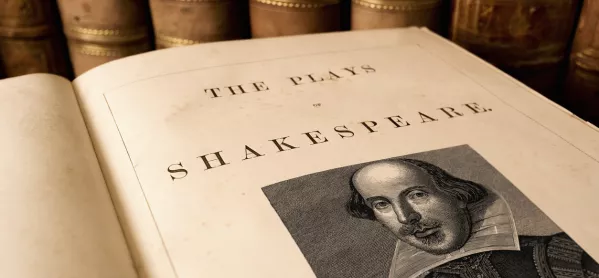
- Home
- Why Shakespeare and Dickens are not ‘complex texts’
Why Shakespeare and Dickens are not ‘complex texts’

I was both intrigued and disappointed to read an article last week that suggested teaching complex Dickens and Shakespeare texts at key stage 3 is “wasteful of precious curriculum time”.
The argument, made by Alex Quigley - the author of Closing the Reading Gap, a research-based book on how to improve pupils’ reading skills - has merit with regards to the view that KS3 needs to be more than a rehearsal for GCSE exams, especially if that rehearsal is dominated by exam paper protocols and the examined set texts.
The National Association for the Teaching of English (NATE) is very concerned that KS3 (60 percent of most students’ secondary English experience) is eroded by excessive focus on an exam that may have been changed by the time Year 7 reach Year 11.
KS3 needs to be reinvigorated, particularly by creating a wide base for literary appreciation and enjoyment. This wider literature base should, as Mr Quigley recommends, include young-adult texts such as Bali Rai’s Rani and Sukh.
But this should be as a complement rather than a “pre-complexity” substitute for Dickens and Shakespeare.
Indeed, what was disappointing was how he supported his argument with the misconceptions that have long plagued how these authors and their texts are approached.
Making Dickens more digestible
It is too simple to represent Dickens’ novels as “complex texts”.
Their complexity for young readers is in their length as complete texts, a result of 19th-century serial publication.
However, they have many parts that are rich and accessible in humorous and thematic appeal. The plots, characters and relationships are not in themselves complex.
The Christmas dinner chapter of Great Expectations, for example, is largely naturalistic dialogue, and the relationships between adults and children are easily understandable, as are ideas of hypocrisy and pomposity and feelings of guilt and fear, let alone the empathetic power of Joe’s affection for the suffering Pip.
In the same novel, the chapter on Wemmick’s retreat at Walworth can be a free-standing example of fantasy made real as an escape from the harsh world of London crime and law, where human warmth can flourish.
By all means, resource the reading repertoire with other fiction dealing with similar themes, but don’t deprive students and teachers of such quality material on the grounds that it is “too complex”.
Universal themes in Shakespeare
A similar misconception is that Shakespeare’s texts are too complex. What’s complex is the grammatical and lexical unfamiliarity.
The characters, relationships, situations, ideas and feelings are not complex - loss of a father, resentment at being passed over for another, mistrust, jealousy, comic mistaken identity, romantic passions and agonies, etc. Students have done most of those in their own lives.
The stories are no more complex than those of teenage fiction or computer games. It is the story that matters for personal, cultural and educational (rather than assessment) purposes.
If students see and hear the stories, that’s all they need to get involved with Shakespeare.
Shakespeare was a dramatist whose scripts never saw publication in book form (ie, as texts) until after his death, and the audience he wrote for did not read them.
What Shakespeare’s audiences saw at the Globe or elsewhere was a version of script in performance.
Popular modern versions of script such as Macbeth on the Estate and Luhrmann’s Romeo and Juliet offer a valid and appealing introduction to Shakespeare in performance for today’s youngsters.
Drama, not literature
Let’s not make the error of turning Shakespeare into literature. He’s drama, and drama is best experienced and appreciated in performance.
Further, as a drama script, Shakespeare’s text is best approached in the classroom by doing it rather than reading it. Taking 10-12 lines from a scene for students to perform with varying edits, emphases and actions is more important than identifying literary features for examination purposes.
If there’s complexity in Shakespeare’s playscript, the best way to engage with it, appreciate it and to prompt more confidence with it is to improvise it, own it, show it - play with it.
Adopting Doug Lemov’s idea of “age-appropriate” books risks confining reading to arbitrary aspects of chronological readiness rather than interest or students’ own cultural capital of personal experience.
Treating Dickens and Shakespeare as “too complex” for KS3 youngsters is a failure to understand Dickens and Shakespeare, cultural and educational priorities and the nature of young people’s capacities and experience.
Peter Thomas is chair of National Association for the Teaching of English and a former principal examiner
Register with Tes and you can read five free articles every month, plus you'll have access to our range of award-winning newsletters.
Keep reading for just £4.90 per month
You've reached your limit of free articles this month. Subscribe for £4.90 per month for three months and get:
- Unlimited access to all Tes magazine content
- Exclusive subscriber-only stories
- Award-winning email newsletters
You've reached your limit of free articles this month. Subscribe for £4.90 per month for three months and get:
- Unlimited access to all Tes magazine content
- Exclusive subscriber-only stories
- Award-winning email newsletters